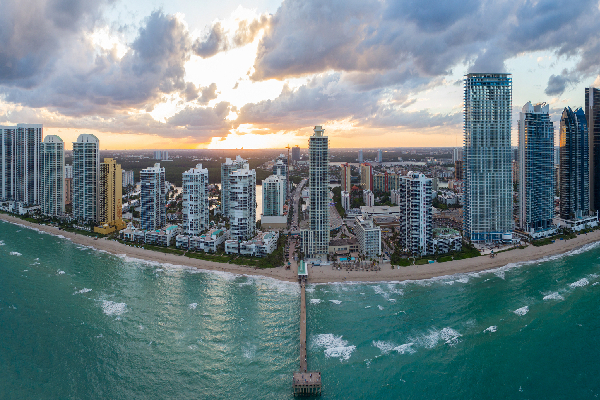In the past year we’ve seen the hotels industry come back to life after a challenging 2020 brought trading to a near halt. With the vaccination roll out taking significant hold in the first two quarters of 2021, there followed a steady rise in the return to consumer travel, especially in domestic leisure destinations. As a result, the appetite for acquisitions and dispositions among investors and owners returned as well.
Contributed by Andy Coleman, head of Berkadia Hotels and Hospitality, Chevy Chase, Maryland
Of course, the emergence of the Delta variant dampened spirits, and travel, a bit, but in the ever-evolving post-COVID environment, we’ve continued to see steady momentum in the hotels sales market. The industry has seen a recording-setting year in terms of transaction volume and deal values.
Nowhere has this been more apparent than in Florida, which is one of, if not the top, market for hotel investment in the United States. We have never seen more deals on the market or in closing than we have recently, and the region notched several record setting sales. Other popular markets include Southern California, coastal Carolinas, the Sunbelt and drive-to-leisure or resort destinations, which have seen similar strength in transactions, owing to desirability among travelers and strong underlying fundamentals.
We’ve been buoyed by the confidence we’ve seen in the market, though it has created some hesitation among owners who are holding out for lofty pricing. Though we’ve seen many hotels trade for record prices, there are some who continue to hold on transacting to see if they can attain even higher values in the coming year following the performance of 2021.
Looking ahead
We expect the first half of 2022 will be among the busiest period for deals we’ve ever seen as an industry. Some of that activity will be owing to currently contracted deals that will slip into 2022 for final closing, but we’re already seeing a lot of activity in terms of listing and financings slated for the new year.
There is record interest for all deal sizes, portfolios and single assets from a wide bench of investors. The big institutional investors are targeting a smaller number of large transactions to deploy the greatest amount of capital to use their resources more effectively.
Of course, there are hurdles in even a strong market – some deal fatigue is creeping in as record numbers of investors are bidding on available deals and inventory challenges make it harder to place capital.

Overall, we’re as confident as ever that the right opportunities can be found to suit any investor strategy, provided they’re considering a broad pipeline of potential acquisitions and keeping in mind long-term goals.
Unknowns remain
Though a record-setting year in many respects, we remain measured in our optimism and tuned into the major factors on the horizon that may impact our market. Three top considerations come to mind for us as we look ahead: labor market challenges, the impact of inflation and evolving travel trends.
Labor scarcity has impacted all sectors, from food service to shipping, and the hotel industry is no different. Adequate staffing and associated cost pressure are top of mind for owners and operators as more and more travel picks up. So far, the industry has kept pace with demand, and has even gained some efficiency in operations, but it’s being closely monitored as continued pressure may start to impact occupancy trends and pricing strategies.
Inflation continues to make headlines, as the consumer price index registered a 6.2% year-over-year increase in November, per the Bureau of Labor Statistics. Inflation can be somewhat beneficial to hotels, as it means the average daily rate goes up. However, increased cost on the labor and expense side can catch up to rate increases. With inflation comes the potential for rising interest rates, which could create upward pressure on cap rates. However, the investor pool remains incredibly well capitalized, and we have seen investors accept lower yield on quality deals. As a result, transaction volume should remain steady.
Travel has rebounded significantly, with leisure travel coming back first and business and convention travel coming back online in the third and fourth quarters. However, while evolving pandemic effects continue to drive greater domestic travel, it still remains to be seen if and how business travel will return in greater force as companies adjust to a post-pandemic environment.
Of course, these are just three of a number of factors that can affect the direction and trajectory of a sustained, long-term market recovery for hotels and which opportunities prove most favorable. Investors and owners who keep apprised of these factors and their evolving impact are most likely to be able to pivot to capitalize on the best market opportunities.
